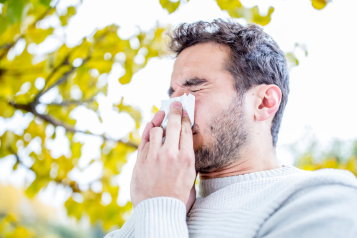What you need to know about flu

Flu is a serious condition that kills on average 11,000 people in England each year and hospitalises tens of thousands more.
Health experts are predicting a big, early wave of flu this winter, and with a rise in Covid cases also expected, people are being urged to get both vaccines to help protect the nation from a double threat this winter.
The flu vaccination is the best protection for you and those around you, which is why it is offered for free for those most at risk.
What is flu?
Flu (short for influenza) is a common infectious viral illness spread by coughs and sneezes. Most people usually recover within two to seven days, but for some the disease can lead to hospitalisation, permanent disability or even death. Those with long term health conditions are more at risk of developing complications from flu and thousands of people end up in hospital suffering from flu every year.
You can catch flu all year round, but it's especially common in winter, which is why it's also known as "seasonal flu". Colds are a different virus – they are less serious and usually start gradually with a stuffy or runny nose, and a sore throat. A bad bout of flu can be much worse than a heavy cold.
But it is also possible to have the infection without having any symptoms.
What are the symptoms of flu?
The most common symptoms of flu are an abrupt onset of fever, chills, headache, aches, sore throat, pains in the joints and muscles, extreme tiredness and a dry cough.
For most people flu infection is just a nasty experience and the symptoms are quite mild, but in others, it can lead to illnesses that are more serious. The most common complications of influenza are bronchitis and secondary bacterial pneumonia.
What are the symptoms of the common cold?
Cold symptoms are limited to the upper respiratory tract with runny nose, sneezing, watery eyes and throat irritation. The symptoms usually occur gradually and do not cause a fever or body aches.
How can I stop the spread of flu?
The flu virus is highly infectious and is easily passed from person to person when an infected person coughs or sneezes. It can also be spread by touching a contaminated surface. The flu virus can live on hard surfaces for up to 24 hours and on a soft surface, such as a tissue, for around 20 minutes.
To reduce the spread of the infection, cover your nose and mouth with a tissue when you cough or sneeze, dispose of the tissue in a bin and wash their hands with soap afterwards.
Am I eligible for a free flu vaccine?
The flu vaccine is given free on the NHS to adults who:
- are 65 and over (including those who will be 65 by 31 March 2023)
- have certain health conditions
- are pregnant
- are in residential care
- receive a carer's allowance, or are the main carer for an older or disabled person who may be at risk if you get sick
- live with someone who is more likely to get a severe infection due to a weakened immune system
- are frontline health workers
- are social care workers who cannot get the vaccine through an occupational health scheme at work.
- From mid-October 2022, people aged 50 years and over can also receive their free vaccine.
-
All primary school children and some secondary school children, as well as youngsters aged two or three, can get a free nasal spray flu vaccine.
Source: NHS
If you aren't eligible for a free jab, you can book a private (paid for) flu vaccination at a local pharmacy.


